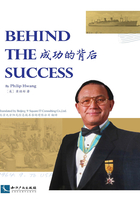
About The Author
President Philip Hwang was born in Hamgyeongdo, Hamhung of North Korea in 1936. In his youth, he was particularly fond of adventures. He risked his life of hiding in the bottom of a US military warship to Busan during the retreat period of the US military. At the age of 14, he accidentally became an“orphan” . To be exact, he served as a servant in the US army during the war. After the war, he polished shoes in Myeong-dong, Seoul. However, he never gave up studying with so many difficulties.
Experiencing numerous hardships, he finally reunited with his family, yet life was still very difficult. He tried to pass the entrance exam of Seoul Institute of Technology with outstanding talents, however, he fainted in the exam room because of starvation of three days and failed the exams. Later, he became a student in the night school of the Hanyang University but often suspended his study due to poverty. After joining the army, he worked as an interpreter for the US military with his proficient English.
In 1964, with the help of his American friend, he met as an interpreter, he borrowed tuition fee to study in the United States. Only USD 50 was left in his pocket after he paid the registration fee. To collect the tuition fee, he worked 16 hours a day. He finally completed the university overcoming a number of obstacles.
Hwang worked as a researcher in FORD after graduation, the famous automobile company. He also worked as a technician for BURROUGHS and NCR in the following several years. However, his dream of becoming an entrepreneur never stopped. The slogan“Sunshine California!” in the newspaper drove him to Silicon Valley with his family.
He took a position in a small company first and worked there for two years. In 1975, he then created his own company“TELE VIDEO” in a broken garage with USD 9,000. He decided to explore the market of monitors for game console dominated by Motorola, and he traveled many times between the United States and South Korea. In the end, he brought those high-quality monitors with reasonable prices into the market.
His success shocked the industry, which also laid a solid foundation for the further development of his company. He then predicted the prospect of colored game console, and demand of black and white monitors would definitely drop. To follow the market trend, he accelerated the R&D (research and development)pace for next project.
The second product was smart terminal. Computer terminals applied in airports and hospitals had no individual functions at all in those days. He installed micro information processors to these terminals with functions such as advanced editing. When computers with same functions were sold at USD 2,000, Hwang promoted his smart terminals at USD 900. Undoubtedly, the sales were booming.“TELE VIDEO” took the first place in the global CRT (cathode ray tube) market.
Hwang was not satisfied with the success of smart terminals, so he embarked his career with new technology for computers. Thus, the first PC network system was invented in the world.“TELE VIDEO” shocked the whole world with its third launch.
The network system servers we are using now are initiated by the President Hwang of“TELE VIDEO”. Network was becoming popular several years later, and his PC network system was undoubtedly a revolution.
He was the first Korean who brought a company listed in NASDAQ during the one hundred years of Korean migration history in the United States in 1983. He ranked No. 27 in the rich list of the United States. Value of his shares had reached USD 1.2 billion with the company capital of USD 2 billion.
He shifted to invest real estate later since he noticed the importance of real estate and the trend. He also penetrated into Russia and China as well as other markets later. His family is now running 3 hotels and apartments having 1,000 units in the Silicon Valley. He has USD 300 million assets.
In 1982, he was awarded AAA Gold Prize for the most successful 50 persons in the world; in 1986, he was awarded the Prize of the Statue of Liberty by US Congress which was issued every century; in 1993, he was appointed to be Technical Advisor to US President George Bush and later, the Advisor to the Presidents of Comi and Sakha Republics of the Russian Federation. In addition, he was awarded the National Medal and Industrial Medal of the President of the Republic of Korea.
By studying at the Harvard Graduate School of Management, he understood that entrepreneurs needed not only technology, but also philosophies to educate young followers. In Silicon Valley, he is one of the few who has been running his own company for 30 years. It is an impossible task without cutting-edge technology and excellent management. He has invested over USD 10 million in more than a dozen South Korean companies by far.
He can be compared with Bill Gates from Microsoft in trends-following; while his unique leadership and entrepreneurial enthusiasm are no less than Jack Welch from GE. He is still an active entrepreneur of this age in the front line, maintaining his spirit of challenging.